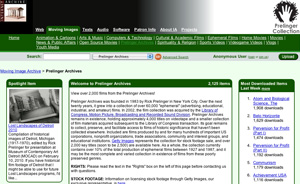talking history | syllabi | students | teachers | puzzle | about us
Prelinger Archives
http://www.archive.org/details/prelinger
Rick Prelinger, in association with the Internet Archive, San Francisco.
Reviewed Aug. 15, 2007.
The Prelinger Archives contains “ephemeral” films (defined as “advertising, educational, industrial, and amateur” films) available for free download. Rick Prelinger began this archive in the 1980s to preserve scarce film materials that historians have tended to overlook in favor of Hollywood productions. In 2002, the Library of Congress acquired sixty thousand titles from Prelinger’s collection; but the Prelinger Archives still exists and continues to grow, allowing this Web site to offer nearly two thousand short films that vividly document the industrial, governmental, educational, and emotional history of the twentieth century. This trove of “lost” treasures, most of which are in the public domain, come in a variety of formats for easy downloading. That, combined with the films' short length (most are twenty minutes or less), make them ideal for classroom use.

Modern historians will probably find greatest interest in the government films, newsreels, advertising, and educational films, but the “amateur films” (many of which have no dates or producers' names) are perhaps the most intriguing. You can find anything from home movies to documentations of the 1939–1940 New York World’s Fair. Produced by random individuals documenting their own lives and interests, the short amateur films demonstrate the fashions and fascinations of many generations of individual Americans.
Although the archive claims to serve historians and researchers, its structure (still a work in progress) makes systematic research somewhat difficult. One disappointing feature is that the “search results” pages never include the films' dates; you must go to each film’s page to see its year of production. The Prelinger Archives is a subset of a larger site, the Internet Archive, which collects digital media of all kinds. Using that site’s search function will lead one into different areas of the labyrinthine Internet Archive, unless one is careful to limit one’s search to the Prelinger Archives.
On the main page of the Prelinger Archives, one can browse an index of topics or select topics from a “tag cloud.” (The tag cloud is an alphabetized depiction of how frequently certain words are used in the descriptions and titles of the films on the Web site. The more times a word is used, the larger that word appears in the cloud, or list.) Neither of those categorizing systems is complete; for example, they both begin by listing three decades-the 1950s, 1960s, and 1970s-which gives the false impression that those thirty years are the only ones represented in the collection; in fact, there are many films from the early twentieth century (one anonymous film shows compelling scenes of downtown San Francisco before the devastation of the 1906 earthquake) and some from after the 1970s. But to find films from a specific span of years, one must execute individual searches. Even then, results are as likely to refer to dates mentioned in the films as they are to the production dates of the films.
None of those navigational headaches prevents the archive from being widely popular; each film has its own page, which includes reviews posted by visitors to the site. On the main page, a sidebar lists the most popular downloads from the previous week; in mid-August 2007, this list included “Afro Mood Burlesque” and “Malibu Mermaid” (a “mild stag film”), as well as “Stripper #1” and “Perversion for Profit,” parts 1 and 2. Clearly, this site is not used only by professional historians. But its value to historical inquiry is tremendous, and the ease with which the films can be adapted for classroom use makes this an archive that any history teacher would find worth browsing-for fun as well as profit.
Ilana Nash
Western Michigan University
Kalamazoo, Michigan
